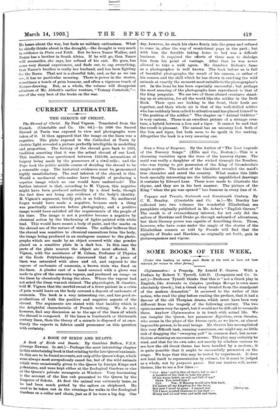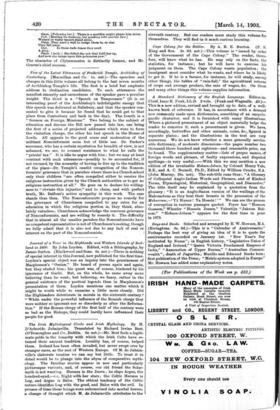SOME BOOKS OF THE WEEK.
[Under this heading we nave such Books of the week as have not hem reierved for review in other forms.] ayteentnestra : a Tragedy. By Arnold F. Graves. With a Preface by Robert Y. Tyrrell, Litt.D. (Longmans and Co. 5s. net.)—Professor Tyrrell thinks that this is "not a Greek play in English, like Ato2atita in Calydon [perhaps Merope is even more absolutely Greek], but a Greek story treated from the standpoint of the modern dramatist." It occurred to the writer of this notice, who read the play before reading the preface, that it had a flavour of the old Thespian drama, which must have been very different from the tragedy of the following century. The two opinions seem very far apart, but it would not be difficult to reconcile them. Anyhow Clytemnestra is in touch with actual life. We can imagine the Queen, her paramour ./Egisthus, even Orestes, who seems in the plays of the Atreus cycle, as we know, an almost Impossible person, to be real beings. Mr. Graves his accomplished this very trifficult task, running sometimes, one might say, no little risk of dragging the "sweeping pall" in common dust, but never- theless attaining an uncommon success. This play may certainly be read, and that for its own sake, not merely by scholars curious to see how the old Greek theme has been handled by a modern; it is quite possible that it might be successfully presented on the stage. We hope that this may be tested by experiment. It does not lend itself to representation by extract, for it must be judged as a whole, not by purpurei panni. But our readers will, never- theless, like to see a few lines CLY. Alas ! and is this all that's loft to me A handful of dry dust to take the place Of his warm heart, so soft and full of sap P Oars. You loved him ? CLT. Yea: if Heaven would give him back, I'd barter all my kiMkdom for the boon. But now I must be gone : I cannot rest Till I have poured libations to his dust :— Honey and oil and wine and milk and team
[-Going up.
ORES. [Following her.] • There is a sacrifice might please him more. CL?. [Reading his meaning, but speaking with averted face.] Women or water cannot stand alone.
Oars. They need a wall to hedge them in, or else They fall away.
Oar. In these rude times they need A prop.
Ouse. [Aside.] She felled the oak that held her And now she hangs upon this poisonous yew."
The character of Clytiemnestra is distinctly human, and Mr. Graves's chief success.











































 Previous page
Previous page